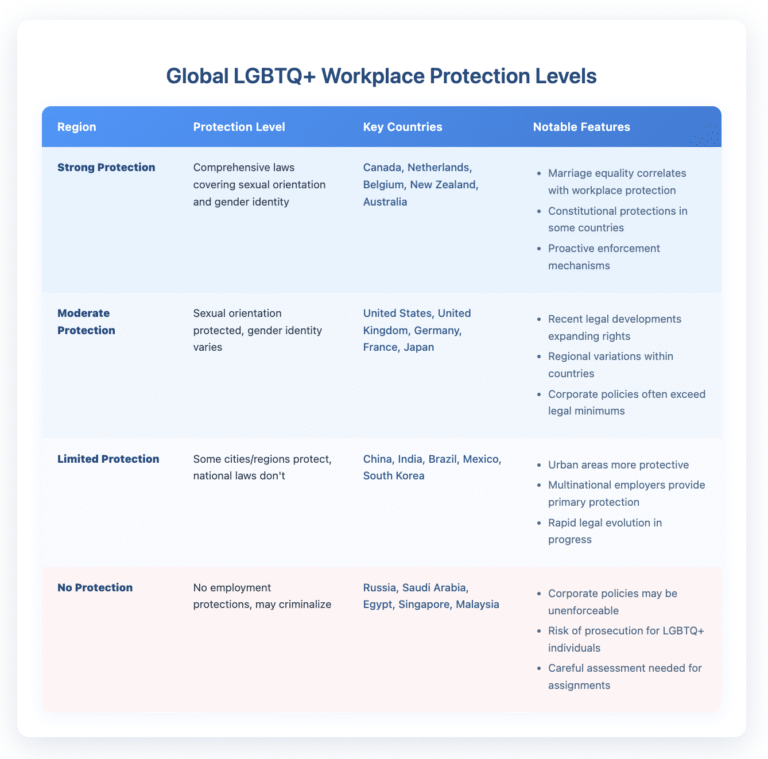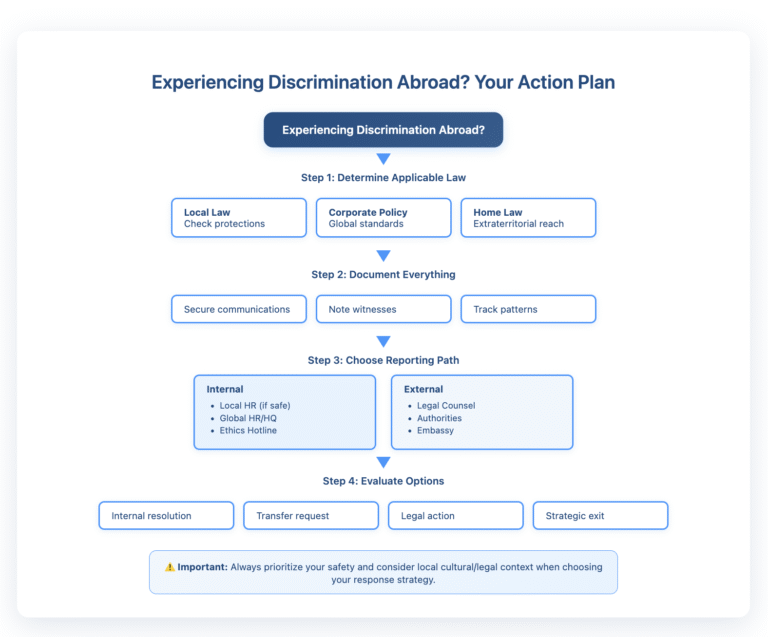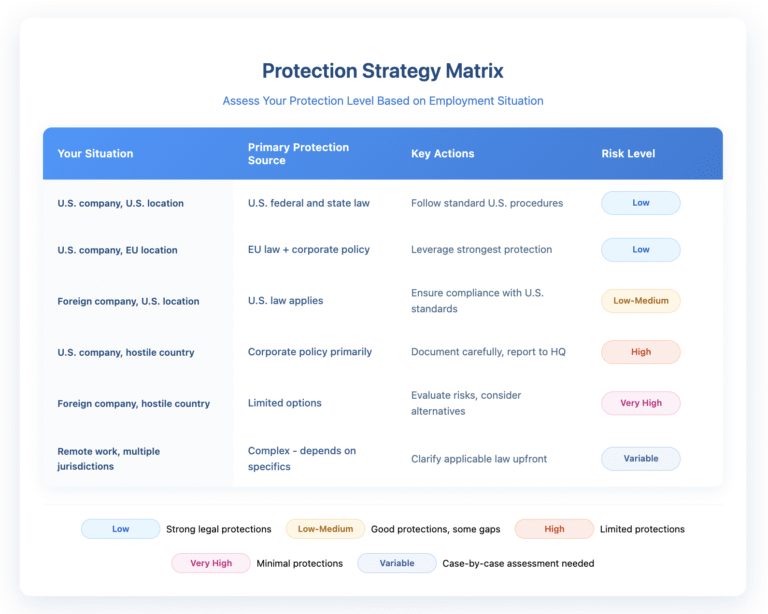If you work for a multinational company or are considering opportunities abroad, understanding international LGBTQ+ workplace protections isn’t just helpful—it’s essential for protecting your career. The reality? Your rights can change dramatically depending on where your employer is headquartered, where you’re working, and which laws apply to your situation.
Here’s what matters most: while some countries offer robust protections that exceed U.S. standards, others provide virtually none. Knowing these differences helps you make informed decisions about international assignments, understand your rights with foreign employers, and leverage the strongest available protections when discrimination occurs.
Disclaimer: This article provides general information for informational purposes only and should not be considered a substitute for legal advice. It is essential to consult with an experienced employment lawyer at our law firm to discuss the specific facts of your case and understand your legal rights and options. This information does not create an attorney-client relationship.
The Global Landscape of LGBTQ+ Workplace Rights
The protection of LGBTQ+ workers varies wildly across the globe. While 81 countries have some form of employment discrimination protection based on sexual orientation, that leaves over 100 countries without explicit protections. Even more concerning? Only about 20 countries explicitly protect gender identity in employment.
This patchwork of protections creates real challenges. A company policy that’s mandatory in Amsterdam might be illegal in Atlanta. An openly gay executive protected in London could face legal termination in Lagos. Understanding these variations isn’t academic—it directly impacts your career decisions and legal options.
European Union: The Gold Standard of Protection
The European Union offers some of the world’s strongest LGBTQ+ workplace protections. The EU Employment Equality Directive prohibits discrimination based on sexual orientation across all 27 member states. This isn’t just symbolic—it requires concrete actions from employers.
These protections cover every aspect of employment: hiring, promotion, training, working conditions, and termination. EU law also recognizes harassment based on sexual orientation as a form of discrimination. Countries like Belgium, Denmark, and Spain go even further, explicitly protecting gender identity and expression.
What makes EU protections particularly powerful is the concept of “horizontal direct effect.” This means you can invoke EU discrimination protections directly against private employers, not just government entities. If you’re a U.S. citizen working for a company’s European office, these protections apply to you.
How Multinational Employers Navigate Conflicting Standards
Multinational companies face a complex challenge: maintaining consistent policies while complying with vastly different legal requirements. Most major corporations adopt the highest common denominator approach—applying their most protective standards globally where legally possible.
But there’s a catch. Companies must still comply with local laws, even when those laws conflict with corporate values. A company that champions LGBTQ+ rights in New York might be legally required to discriminate in countries where same-sex relationships are criminalized.
The Extraterritorial Question
Here’s a critical point many employees don’t understand: U.S. employment laws, including Title VII protections affirmed in Bostock v. Clayton County, generally don’t follow you overseas. If you’re a U.S. citizen working in your company’s Dubai office, you’re primarily protected by UAE law, not U.S. law.
There are limited exceptions. U.S. anti-discrimination laws can apply to U.S. citizens working abroad for U.S. employers or U.S.-controlled foreign entities. However, these protections don’t apply if compliance would violate the host country’s laws. This “foreign law exception” creates a significant gap in protection.

Understanding Regional Variations
Let’s get specific about major business regions and what protections actually exist. This isn’t just about knowing your rights—it’s about making strategic career decisions.
Asia-Pacific: A Region of Contrasts
The Asia-Pacific region presents the starkest contrasts in LGBTQ+ workplace protections. Australia and New Zealand offer comprehensive protections comparable to the EU. Australia’s Sex Discrimination Act explicitly prohibits discrimination based on sexual orientation, gender identity, and intersex status.
Meanwhile, major business hubs show varying approaches. Hong Kong prohibits sexual orientation discrimination in government employment, but not in the private sector. Japan has no national protection, though Tokyo and other major cities have enacted local ordinances. Singapore maintains colonial-era laws criminalizing same-sex relations, though enforcement is selective.
For U.S. workers, this means carefully evaluating assignments. That promotion to lead the Singapore office might come with significantly reduced legal protections. Document any discrimination meticulously, as you may need to pursue remedies through corporate channels rather than local courts.
The Americas: Beyond the United States
Canada offers stronger explicit protections than the United States. The Canadian Human Rights Act has prohibited discrimination based on sexual orientation since 1996 and gender identity since 2017. These protections are also enshrined in the Canadian Charter of Rights and Freedoms.
Latin America shows increasing recognition of LGBTQ+ rights. Argentina, Brazil, Chile, and Uruguay prohibit employment discrimination based on sexual orientation. Mexico’s Supreme Court has ruled that discrimination based on sexual orientation violates constitutional rights, though implementation varies by state.
Leveraging Corporate Policies in Hostile Jurisdictions
When local laws don’t protect you, corporate policies become your primary shield. Many Fortune 500 companies have global non-discrimination policies that include sexual orientation and gender identity. These policies can provide recourse even in countries without legal protections.
However, enforcing corporate policies requires strategy. Document violations carefully, following company reporting procedures exactly. Use secure communication channels, as local surveillance laws might not protect your privacy. Consider reporting to headquarters in a protective jurisdiction rather than local management.
The Role of International Pressure
International business pressure increasingly drives LGBTQ+ workplace protections. Companies face reputational risks and talent retention challenges if they’re seen as discriminatory. The Human Rights Campaign’s Corporate Equality Index and similar metrics influence corporate behavior globally.
This creates leverage for employees. Companies worry about losing talent and facing publicity challenges. When discrimination occurs, framing it as a business risk—not just a legal issue—can motivate action even where laws don’t mandate it.

Practical Strategies for International Workers
Working internationally as an LGBTQ+ person requires careful planning. Before accepting an international assignment, research not just the legal landscape but also the social climate. Legal protections mean little if social hostility makes daily life unbearable.
Request written confirmation of how corporate policies apply in your destination country. Get specifics: Will same-sex partner benefits continue? How will the company handle visa issues for same-sex spouses? What support exists if you face discrimination?
Documentation Strategies for International Settings
Documentation becomes even more critical in international contexts. Use encrypted communication and secure cloud storage, as local privacy laws may not protect your records. When possible, communicate discrimination concerns in writing to create a paper trail.
Keep copies of all relevant policies: local law, corporate global policies, and any specific protections for expatriate employees. Note which country’s law governs your employment contract—this choice of law provision could be crucial if disputes arise.
The Impact of International Treaties and Agreements
International human rights treaties increasingly recognize LGBTQ+ rights, though enforcement mechanisms remain weak. The International Labour Organization (ILO) has called for the end of employment discrimination based on sexual orientation and gender identity.
The Yogyakarta Principles, while not legally binding, provide guidance on applying international human rights law to sexual orientation and gender identity. Some regional bodies, like the European Court of Human Rights, have ruled that discrimination based on sexual orientation violates human rights conventions.
These international frameworks matter because they influence domestic law development and corporate behavior. Companies operating globally increasingly align policies with international human rights standards to maintain legitimacy.
Trade Agreements and LGBTQ+ Rights
Modern trade agreements increasingly include labor provisions that address discrimination. The United States-Mexico-Canada Agreement (USMCA) includes commitments to address employment discrimination, though enforcement remains challenging.
These provisions create diplomatic pressure for improved protections. While they rarely provide direct individual remedies, they contribute to gradual improvement in workplace rights globally.

Emerging Trends in Global Protection
The trajectory of international LGBTQ+ workplace protection is generally positive but uneven. Countries like India, which decriminalized same-sex relationships in 2018, are gradually moving toward employment protections. Taiwan became the first Asian jurisdiction to recognize same-sex marriage, signaling potential workplace protection improvements.
However, backlash exists. Some countries have strengthened anti-LBGTQ+ laws in recent years. Poland’s “LGBT-free zones” and Hungary’s restrictive legislation demonstrate that progress isn’t linear. Understanding these trends helps you anticipate future changes in protection levels.
The Remote Work Revolution
The COVID-19 pandemic’s remote work explosion creates new complexities for international LGBTQ+ protection. If you’re working remotely for a company headquartered in San Francisco while living in Singapore, which laws apply? These questions remain largely unsettled.
Generally, the location where you physically work determines applicable law. However, employment contracts might specify a different governing law. Companies increasingly need clear remote work policies addressing discrimination and protection standards across jurisdictions.
Building Your International Protection Strategy
Creating a comprehensive protection strategy requires understanding multiple legal systems and corporate policies. Start by mapping all potentially applicable protections: home country law, host country law, corporate policies, and relevant international frameworks.
Identify allies within your organization. Employee resource groups, diversity officers, and global HR professionals can provide support and guidance. Building these relationships before problems arise strengthens your position if discrimination occurs.
Consider purchasing international legal insurance if working in high-risk jurisdictions. Some policies cover employment disputes and can provide access to local counsel familiar with LGBTQ+ issues.
Next Steps: Protecting Your International Career
International employment offers tremendous opportunities but requires careful navigation of varying LGBTQ+ protections. Your strategy should be proactive, not reactive. Research thoroughly, document carefully, and know your options before problems arise.
Key actions to take:
- Research specific protections in any country where you might work
- Get written confirmation of applicable corporate policies
- Understand which country’s law governs your employment
- Build support networks before you need them
- Document any discrimination immediately and securely
Remember, even in challenging jurisdictions, you have options. Corporate policies, international pressure, and strategic advocacy can provide protection where laws fall short. The key is understanding the landscape and planning accordingly.
If you’re facing discrimination in an international employment context or need guidance on navigating global LGBTQ+ workplace protections, Nisar Law Group can help. Contact us to discuss your situation and develop a strategy that protects your rights across borders. Your career shouldn’t be limited by geography—let’s work together to ensure you’re protected wherever your ambitions take you.


